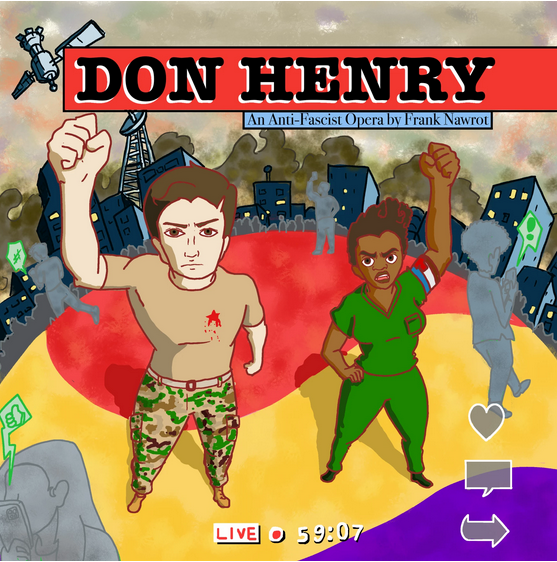
By LUKE X. MARTIN
Kansas News Service
Frank Narwot first learned of Don Henry’s short life and sacrifice while glancing over a trivia display at a Lawrence, Kansas, brewpub.
“I read his story,” the guitarist and music professor at Wichita State University said, “and I was, like, ‘OK, I’ve got to write some music about this.”
What a muse. A college kid from bucolic Dodge City, Kansas, radicalized by friends and professors at the University of Kansas, lied to his family so he could fight fascists in the Spanish Civil War of the 1930s. Then he died on his first day in combat. A quest, a cause and a death fit for the stage.
It took Nawrot about five years, but in September he released the first opera to take on Henry’s story. Nawrot's “Don Henry” is a four-part series available on many podcast platforms. Its sound straddles genres.
“I grew up listening to, you know, Prince and (Swedish metal band) Meshuggah, popular music,” Nawrot said. “So the music that I create, and the music that I play, kind of blends those two worlds.”
Poetry and historical documents, too, served as inspiration.
“The opera experts, I don't know if they're gonna call it an opera or not … I don't have a problem with it being called an opera or a rock opera or a concept album or whatever,” he added. “As long as they listen to it.”

A Kansas boy
The real-life Henry was born in 1917.
“He was a religious boy,” Nawrot said. “He went to church and did all the normal things a young man in Kansas would do.”
A short history of Henry’s life written by Brian Drake, formerly of KU’s history department, says Henry was an active Boy Scout, a member of his high school debate club, and a devoted Methodist who considered a career with the church after graduation.
“It came as a considerable surprise, then, when a front-page story in the University Daily Kansan on October 3, 1937, revealed that ‘flaxen-haired Don Henry’ had been killed in combat the month before, fighting in Spain with the left-wing Loyalists against right-wing Nationalist rebels led by General Francisco Franco,” Drake wrote.
According to that 1937 edition of KU’s student newspaper, Henry and another KU student had traveled to Spain four months earlier and joined what was called the Abraham Lincoln Brigade.
“This was at a time when Mussolini had come to power and then Hitler and then in Spain … there was the threat of Francisco Franco, who was another sort of racial nationalist figure,” said Nawrot. “So Don Henry and thousands of people from around the world, from everywhere around the world, became part of what's known now as the International Brigades.”

“He went to a foreign country to fight alongside people he's never
met to stop an idea from spreading,” Nawrot said. “It gives me
goosebumps to think about.”
A red scare
News of Henry’s death set off a political firestorm when it reached his kin back in Kansas. Henry’s father blamed his son’s college experience for his decision to go to Spain and demanded KU’s chancellor, Ernest H. Lindley, launch an investigation.
Lindley’s personal inquiry was followed by a different investigation by the Kansas Board of Regents. Drake’s history says three Regents were told to look into “communistic activity” on campus. In turn, lawmakers in Topeka began their own probe into radicalism at KU. The Regents’ report eventually made its way to the the U.S. House of Representatives Special Committee on UnAmerican Activities.
“I
saw this story that was so close to where I was — not only in location,
but in time, right?” Nawrot said. “His story was in the ‘30s … Our
story is now, but a lot of the same things were happening, and a lot of
the same fears and anxieties were happening among working people.”
An opera begat
To help push this narrative, and listeners, into the 21st century, Nawrot’s opera used what sounds at first like the prototypical cable news broadcast.
“I kind of thought it would be funny, to be honest,” he said. “What would it be like if Fox News or, you know, CNBC or one of these other 24-hour news channels covered the Spanish Civil War of the late 1930s?”
The result resembles some amalgam of conservative media personalities Megyn Kelly and Bill O’Rielly.
“These types of people, they're great actors. They're great performers. They're great speakers, and they're really selling a particular brand of politics,” Nawrot said. “But they're doing it, you know, in this really vaudevillian way.”
Nawrot’s libretto, or opera text, also derives from the Kansas Board of Regents report, poems written by members of the British International Brigade, and a letter Henry sent to his family before his death revealing the nature of his trip to Spain.
“At the very end, he says, ‘Oh, by the way, P.S., can you send me some socks?’” Nawrot said. “It gives me chills to think that he was brave enough at a point in his maturity to do what he did, but to also still be so connected to his family.”
With his opera now released into the wild, Nawrot’s hope is to have it staged.
“I have plans,” he said, “but nobody else does.”
But he has a recording, and a proof of concept, to pitch.
“If I do meet somebody who, you know, has an opera company or knows somebody who has an opera company,” he said, “I could say, ‘Hey, I have the whole thing recorded. Here's the libretto, here's the score, and here's all the music.’ ”



